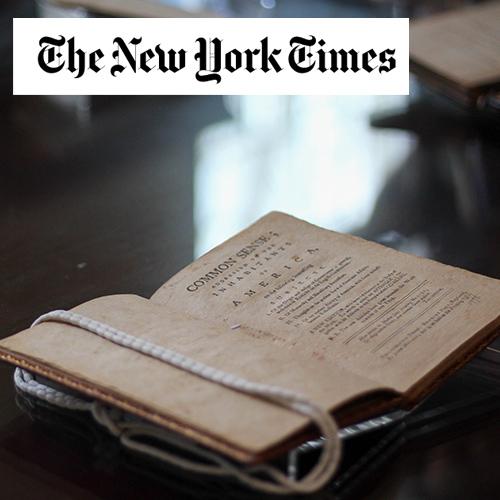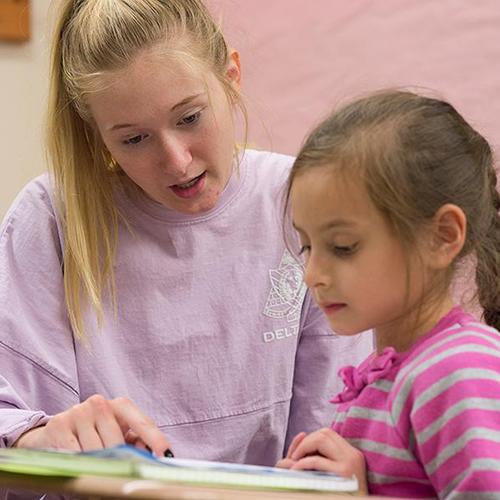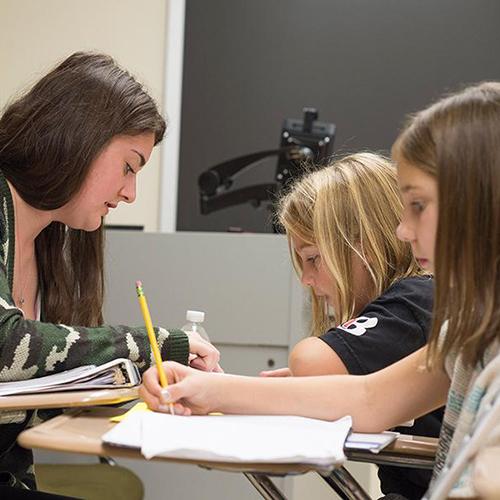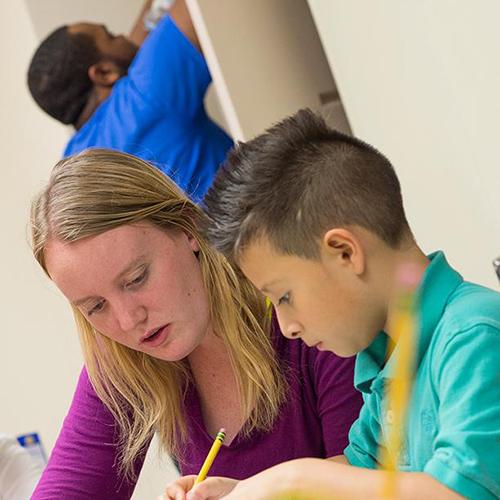What is a Literacy Specialist?
Literacy specialists help children develop and improve their literacy skills by providing supplemental instruction to students who struggle with reading and writing. They also work to improve school-wide literacy levels by supporting other teachers and faculty with curricula planning and literacy training.
What is Literacy Education?
To better understand what a literacy specialist is and what they do, it is essential to have a firm understanding of what literacy education entails.
Literacy is the ability to read, write, speak and listen. A child’s literacy education begins at birth and encompasses the acquisition and development of language. Learning disabilities and socio-cultural and environmental factors like home environment, access to books and toys, child care and the number of languages spoken at home can also influence a child’s literacy and early learning abilities.
Formal literacy education takes place in the classroom, beginning in preschool. These early efforts target what the National Reading Panel identifies as the five components of reading:
- phonemic awareness;
- phonics;
- fluency;
- vocabulary;
- comprehension.
Cultivating these individual elements of reading and language prepares students to acquire more advanced literacy skills. When students do not meet critical literacy benchmarks, they receive supplemental instruction from literacy specialists to ensure their reading, writing and speaking skills improve.
Literacy Education in Early Childhood
A child’s aptitude for learning begins in infancy and is shaped by the acquisition and development of language skills. If a child experiences disruptions or developmental delays in their language growth, it can impact the cognitive skills needed to become proficient readers and writers.
Early childhood literacy education focuses on the cognitive skills children need to become strong readers and writers. The focus is on concepts like oral language, alphabetic principle and print awareness. Establishing these foundational skills is especially critical for young children because 90 percent of children’s neural pathways are developed by six years old.
Literacy in Special Education
Literacy education is especially important to students with special needs and learning disabilities. Oftentimes, students with learning disabilities need the support of a literacy specialist to aid in the development of their reading and writing skills.
Students with disabilities have different learning styles, and their literacy education should accommodate their needs. Literacy specialists work with students to strengthen their vocabulary, fluency, comprehension, orthographic (writing structure) skills and phenomic and phonological awareness (sound structures). With a customized learning experience, children with special needs and learning disabilities can improve their reading and writing capabilities.
Why is Literacy Education Important?
Childhood literacy education, or the lack thereof, can affect children’s overall academic performance. Although often associated with English Language Arts because of their shared attention to reading and writing, literacy education is critical to the success of a student’s entire education. The essential skills literacy education supports, like reading comprehension and vocabulary acquisition, are utilized in every subject area. If literacy development is delayed, academic performance may suffer.
The Office of Disease Prevention and Health Promotion (OASH) reports 23 percent of children with below-average reading skills do not graduate from high school. Comparatively, nine percent of children with basic reading skills do not complete their secondary education. Without a high school diploma, it is difficult for an individual to secure a steady career and maintain economic stability.
When considering the repercussions of underdeveloped reading and writing abilities, it becomes evident that holistic literacy education is essential because it improves a child's quality of life and sets them up for success.
What Does a Literacy Specialist Do?
A literacy specialist’s primary duty is to support students and their literacy development. According to the National Assessment of Educational Progress (NAEP), recent results indicate that nationwide fourth and eighth-grade reading scores have decreased by 3 points since 2019, emphasizing that literacy specialists are as important as ever.
Literacy specialists often observe students in their classes or administer assessments to evaluate those struggling with reading and writing. Once they identify children in need of help, literacy specialists use their expertise to determine individualized learning objectives and design lesson plans and appropriate learning activities.
While literacy exercises vary based on age level and individual abilities, literacy specialists work to engage reading, writing, speaking and listening to strengthen all components of a child’s skills.
Literacy specialists also function in highly collaborative roles and regularly work with fellow faculty members. They train their colleagues on the five components of reading, pedagogical techniques to improve students’ literacy skills and how to identify students struggling with reading and writing. They also collaborate with teachers to create curricula that integrate literacy instruction in all subjects.
Schools may have several literacy specialists working in different roles to fulfill the student body’s needs. In this case, there may be collaborative efforts between literacy specialists to develop educational resources for their students and instructional resources for their colleagues. Literacy specialists may also support school administrators to ensure the school participates in state-lead literacy initiatives and meets requirements.
How to Become a Literacy Specialist
Required Education for Literacy Specialists
Becoming a literacy specialist begins with earning a bachelor’s degree. Many pursue an undergraduate degree in education and add a literacy or reading endorsement to gain specialized knowledge and provide quality literacy instruction to students. Select colleges and universities may also offer bachelor’s degree programs in literacy or literacy studies.
Once you complete a degree program, fulfill the student-teaching practicum and acquire your state licensure, you are ready to begin working with students.
A graduate degree may be required to become a literacy specialist in certain states and school districts. Working with children who are struggling academically and providing school faculty and administration with consultations about curricula and how to support students requires an advanced level of specialized knowledge and training.
Learn More: Education (BA, BS)
Acquire Further Certification
While certification specifics change from state to state, literacy specialists often need a literacy certificate or endorsement along with their initial or provisional state certification. Additional certification ensures teachers have state-approved pedagogical training and are prepared to work with students needing supplemental literacy instruction.
For instance, the New York State Education Department (NYSED) requires those interested in working as a literacy specialist to obtain a Literacy (All Grades) Certificate. Many paths include required coursework, supervised practicum and a certification exam. Numerous certification pathways are available, allowing teachers to personalize their career preparation.
Educators seeking literacy certification should also consider earning a Master of Science in Education program that leads to advanced certification.
To discover your state’s teaching certification requirements, visit the U.S. Department of Education’s State Contacts directory.
Types of Literacy Specialist Careers
Although “literacy specialist” encompasses trained educators who directly work with students on literacy skills, it can include a variety of careers such as:
- literacy coach;
- literacy consultant;
- literacy interventionist;
- reading specialist;
- reading teacher.
The specific job titles and responsibilities may vary, but overall these roles share the same objective of cultivating students’ core literacy and the cognitive skills they need to support their reading and writing.
Iona University’s Master of Science in Education
Iona University’s Master of Science in Education (MSEd) degree elevates your pedagogical expertise and prepares you to advance your teaching career. Taught by a dedicated faculty, our master’s program is founded on leading educational research and field-based experience, setting students on the path to academic and professional success.
Our MSEd is created for certified teachers eager to continue their education and expand their professional goals. The master’s in education program is customizable and offers multiple specialization tracks, including:
- Literacy (Birth-Grade 6)
- Literacy (Birth-Grade 6) and Special Education
Adolescence Special Education (Grades 5 – 12) and Literacy
Pursuing a specialized MSEd allows students to develop the highly-focused skill set they need to succeed in their chosen career path. Each specialization includes a rigorous curriculum, provides hands-on classroom experience and helps students build an impressive portfolio to add to their résumé and support their post-graduation career growth. Furthermore, the MSEd specializations lead students toward New York state advanced teaching certifications.
Help Strengthen Reading and Writing Skills as a Literacy Specialist
Working as a literacy specialist provides the exciting opportunity to elevate your teaching career, enrich children’s reading and writing skills and improve their overall academic performance.
With its focus on pedagogical excellence and commitment to innovating the education field, Iona’s Master of Science in Education degree helps teachers continue their professional development and excel as educators serving diverse learners.
To continue learning about Iona’s MSEd program, request more information.





